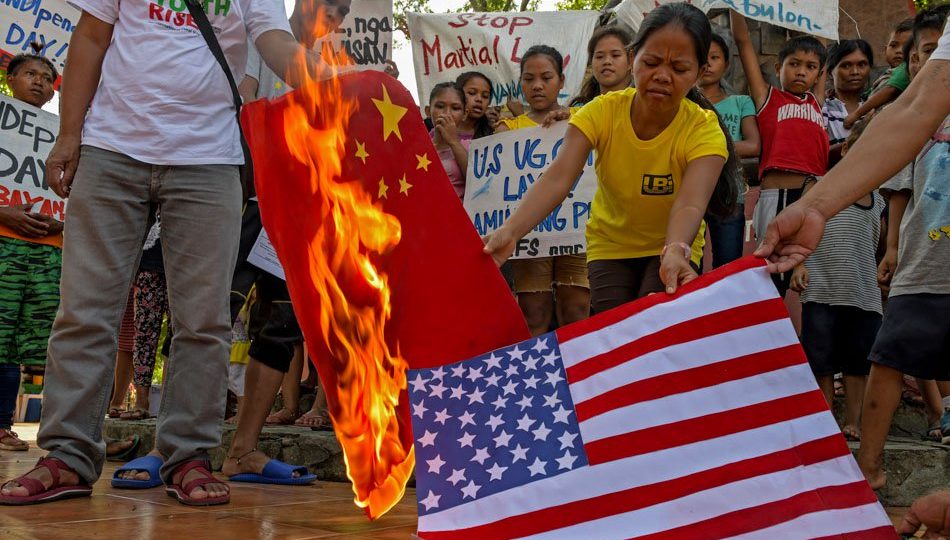If you were plugged-in to Philippine social media yesterday, you probably noticed that #HINDIPendenceDay was trending.
The pun probably went over the heads of those who don’t speak Filipino but basically, it is a play on the Filipino word “hindi,” which means “no,” and the English word “independence” — a form of online protest amidst yesterday’s Independence Day celebrations.
Filipinos all over the country celebrated the 120th Philippine Independence Day in a number of ways.
Vice President Leni Robredo led the flag rites at Luneta Park.
https://twitter.com/lenirobredo/status/1006407931066118145
Actor Paulo Avelino showed up in full costume as war hero Gregorio del Pilar during the Kalayaan (Freedom) Parade in Manila.
https://instagram.com/p/Bj6r6zEn6s1/?utm_source=ig_embed
And some malls hung Philippine flags as if they were banderitas in a fiesta.
https://instagram.com/p/Bj6roiVjMcC/?utm_source=ig_embed
But some also used yesterday’s holiday to protest against the administration and various issues the country is facing, a movement some called Hindipendence Day (Not Independence Day).
A number of protesters heckled Philippine President Rodrigo Duterte’s speech in Kawit, Cavite yesterday, calling him a “traitor.”
According to the state-run Philippine News Agency, one of the protesters was arrested by police for “causing disturbance,” all while the president was talking about the freedom of the press, freedom of assembly, and free expression afforded by the constitution.
Leftist Filipino organization GABRIELA (General Assembly Binding Women for Reforms, Integrity, Equality, Leadership, and Action) also rallied in Manila to bring back the comfort woman statue to its original location.
In April, the statue, which aimed to honor the comfort women victimized during the Japanese occupation, was removed from Manila’s Roxas Boulevard.
The Philippine Department of Public Works and Highways said that it was done to “give way for the improvement of Roxas (Boulevard) Baywalk Area” but others think the removal was in response to Japan voicing regret over it.
In a tweet, GABRIELA said: “Gabriela Congresswoman Arlene Brosas supported the #Flowers4Lolas Campaign to demand return of the uprooted comfort woman statue to its original location, resist Japanese government’s efforts to erase memories of wartime crime of sexual enslavement of Asian women #HINDIpendenceDay.”
Gabriela Congresswoman Arlene Brosas supported the #Flowers4Lolas Campaign to demand return of the uprooted comfort woman statue to its original location, resist Japanese gov't efforts to erase memories of wartime crime of sexual enslavement of Asian women #HINDIpendenceDay pic.twitter.com/cj842yal2R
— Gabriela Women's Party (@GabrielaWomenPL) June 12, 2018
Other demonstrators gathered in front of the Chinese consulate in Makati City to denounce China’s encroachment in the Philippines.
👀: Filipinos gather in front of the Chinese consulate in Makati to protest Chinese incursion and plunder of PH. This marks the first wave of protests for today's commemoration of #HINDIpendenceDay!
US, China, out of our territories!
Down with imperialism! pic.twitter.com/Ojfxko6QpE— League of Filipino Students (@LFSPhilippines) June 12, 2018
“China out of the Philippine waters,” one of the protester’s signs said, referring to the maritime dispute in the West Philippine Sea.
LOOK: #HINDIpendenceDay rally at the Chinese embassy pic.twitter.com/lfra79vQl3
— Movement Against Tyranny (@TheMovementPHL) June 12, 2018
Yesterday’s Google Doodle, which paid tribute to Philippine seas, also eventually led to a discussion on the territorial dispute.
“Google Doodle for June 12 is ‘woke’: a timely tribute to our seas and rich aquatic resources,” wrote Twitter user @tonyocruz.
Google Doodle for June 12 is “woke”: a timely tribute to our seas and rich aquatic resources#HINDIpendenceDay rally 4pm at Liwasang Bonifacio pic.twitter.com/qs4ZwIVA2l
— Tonyo Cruz (@tonyocruz) June 11, 2018
Twitter user @YeshuaCano wrote: “It’s so funny how Google used the marine resources of the Philippines to celebrate the country’s independence. With the recent events, it makes you ask if we truly are free and independent.”
It's so funny how Google used the marine resources of the Philippines to celebrate the country's independence. With the recent events, it makes you ask if we truly are free and independent.
— y. martin cano (@YeshuaCano) June 12, 2018
Another user by the handle @iamloves tweeted, “Google’s doodle for Philippines’ independence is referencing our country’s rich maritime resources, but maybe also a subtle reaction to the growing aggressiveness of China in the West Philippine Sea.”
Google's doodle for Philippines' independence is referencing our country's rich maritime resources, but maybe also a subtle reaction to the growing agressiveness of China in the West Philippine Sea. Hmmmm touché. pic.twitter.com/s1ZKtxM54M
— loven (@iamloves) June 12, 2018
What did you do yesterday? Did you celebrate Independence Day or were you one of the #HINDIPendenceDay protesters? Let us know in the comments section below or tweet us @CoconutsManila.





Reader Interactions